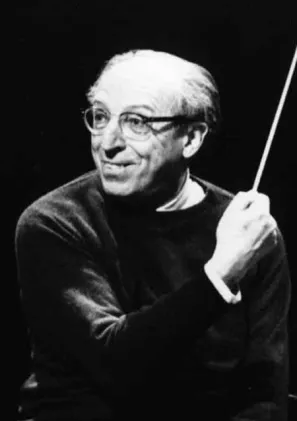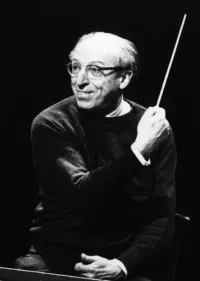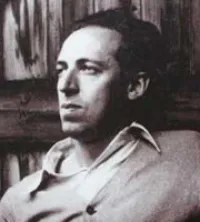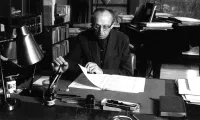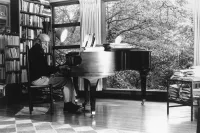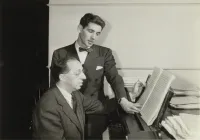Biography
1900 - 1990
“To stop the flow of music would be like the stopping of time itself, incredible and inconceivable.”
– Aaron Copland
He graduated from the Fontainebleau School of Music in 1921, having earned a reputation as a radical young composer. His first major composition, the Symphony for Organ and Orchestra (1924), was premiered by the New York Symphony. In the late 1920s, Copland turned to creating music with an American accent and, by the 1930s, he had become the acknowledged leader of young American composers. He is acclaimed for his balletic scores for Billy the Kid (1938), Rodeo (1942) and Appalachian Spring (1944) and for his film scores including Of Mice and Men (1939), Our Town (1940), The Red Pony and The Heiress (both 1948). Among Copland’s most enduring works are A Lincoln Portrait and Fanfare for the Common Man (both 1942). The Third Symphony (1946), his most famous, is regarded by many as the greatest American symphony ever written. Copland was an affable, modest and mild-mannered man who valued friendships and thrived in social settings. Like many of his contemporaries, he guarded his privacy, especially in regard to his homosexuality, but was one of the few composers of his stature to live his life without pretense, often appearing in public with his male lovers. Copland is one the most recognized 20th-century composers of classical music in the US. His honors, fellowships and awards include the Prix de Paris, the Congressional Gold Medal, The Kennedy Center Honors, The Pulitzer Prize, Grammy, Emmy and Oscar nominations and awards, Fulbright and Guggenheim fellowships, the Medal of Arts and the Medal of Freedom. He died of respiratory failure in 1990.
1900 - 1990
“To stop the flow of music would be like the stopping of time itself, incredible and inconceivable.”
– Aaron Copland
He graduated from the Fontainebleau School of Music in 1921, having earned a reputation as a radical young composer. His first major composition, the Symphony for Organ and Orchestra (1924), was premiered by the New York Symphony. In the late 1920s, Copland turned to creating music with an American accent and, by the 1930s, he had become the acknowledged leader of young American composers. He is acclaimed for his balletic scores for Billy the Kid (1938), Rodeo (1942) and Appalachian Spring (1944) and for his film scores including Of Mice and Men (1939), Our Town (1940), The Red Pony and The Heiress (both 1948). Among Copland’s most enduring works are A Lincoln Portrait and Fanfare for the Common Man (both 1942). The Third Symphony (1946), his most famous, is regarded by many as the greatest American symphony ever written. Copland was an affable, modest and mild-mannered man who valued friendships and thrived in social settings. Like many of his contemporaries, he guarded his privacy, especially in regard to his homosexuality, but was one of the few composers of his stature to live his life without pretense, often appearing in public with his male lovers. Copland is one the most recognized 20th-century composers of classical music in the US. His honors, fellowships and awards include the Prix de Paris, the Congressional Gold Medal, The Kennedy Center Honors, The Pulitzer Prize, Grammy, Emmy and Oscar nominations and awards, Fulbright and Guggenheim fellowships, the Medal of Arts and the Medal of Freedom. He died of respiratory failure in 1990.
Lesson Plan
Please login or register for an account to view this lesson plan.
Demography
Demography
Gender Male
Sexual Orientation Gay
Gender Identity Cisgender
Ethnicity Caucasian/White
Faith Construct Agnostic
Nations Affiliated France Italy United States
Era/Epoch Cold War (1945-1991) Information Age (1970-present) Interwar Period (1918-1939)
Field(s) of Contribution
Art, Music, Literature & Theater
Education
Journalism
Lecturer
Media & Communications
Music
Social Sciences
US History
Commemorations & Honors
Guggenheim Fellowship (1925 and 1926)
Pulitzer Prize Award for Appalachian Spring (1945)
New York Music Critics' Circle Award for Appalachian Spring (1945)
Academy Award for Best Musical Score for The Heiress (1950)
Fulbright Fellowship Recipient (1951)
American Academy and Institute of Arts and Letters Gold Medal Recipient (1956)
Awarded the Edward MacDowell Medal by the MacDowell Colony (1961)
Presidential Medal of Freedom For Music (1964)
Commander’s Cross of the Order of Merit from West Germany Recipient (1970)
Kennedy Center Honoree (1979)
Queens College of the City University of New York Department of Music Renamed Aaron Copland School of Music (1981)
Grammy's National Trustees Award (1981)
National Medal of Arts Award (1986)
Special Congressional Gold Medal by the United States Congress (1987)
Posthumous Grammy Hall of Fame Induction for Applachian Spring (2000)
Copland's Home Rock Hill Added to the National Register of Historic Places (2003)
Posthumous Grammy Hall of Fame Induction for Symphony No. 3 (2007)
Copland's Home Rock Hill Named a National Historic Landmark (2008)
Posthumous Grammy Hall of Fame Induction for Fanfare for the Common Man (2009)
Demography
Gender Male
Sexual Orientation Gay
Gender Identity Cisgender
Ethnicity Caucasian/White
Faith Construct Agnostic
Nations Affiliated France Italy United States
Era/Epoch Cold War (1945-1991) Information Age (1970-present) Interwar Period (1918-1939)
Field(s) of Contribution
Art, Music, Literature & Theater
Education
Journalism
Lecturer
Media & Communications
Music
Social Sciences
US History
Commemorations & Honors
Guggenheim Fellowship (1925 and 1926)
Pulitzer Prize Award for Appalachian Spring (1945)
New York Music Critics' Circle Award for Appalachian Spring (1945)
Academy Award for Best Musical Score for The Heiress (1950)
Fulbright Fellowship Recipient (1951)
American Academy and Institute of Arts and Letters Gold Medal Recipient (1956)
Awarded the Edward MacDowell Medal by the MacDowell Colony (1961)
Presidential Medal of Freedom For Music (1964)
Commander’s Cross of the Order of Merit from West Germany Recipient (1970)
Kennedy Center Honoree (1979)
Queens College of the City University of New York Department of Music Renamed Aaron Copland School of Music (1981)
Grammy's National Trustees Award (1981)
National Medal of Arts Award (1986)
Special Congressional Gold Medal by the United States Congress (1987)
Posthumous Grammy Hall of Fame Induction for Applachian Spring (2000)
Copland's Home Rock Hill Added to the National Register of Historic Places (2003)
Posthumous Grammy Hall of Fame Induction for Symphony No. 3 (2007)
Copland's Home Rock Hill Named a National Historic Landmark (2008)
Posthumous Grammy Hall of Fame Induction for Fanfare for the Common Man (2009)
Resources
Resources
Berger, Arthur V. Aaron Copland. New York: Da Capo Press, 1990.
Butterworth, Neil. The Music of Aaron Copland. London: Toccata Press, 1986.
Copland, Aaron, and Vivian Perlis. Copland: 1900 through 1942. New York: St. Martin's, 1984.
Copland, Aaron, and Vivian Perlis. Copland: since 1943. New York: St. Martin's, 1989.
Pollack, Howard. Aaron Copland: The Life and Work of an Uncommon Man. New York: Henry Holt, 1999.
https://igfculturewatch.com/2000/08/30/aaron-copland-at-100/
http://www.listenmusicculture.com/mastery/copland-you-know
https://www.jstor.org/stable/3052389?seq=1#page_scan_tab_contents
https://www.theatlantic.com/magazine/archive/2000/01/who-was-that-masked-composer/306475/
Resources
Berger, Arthur V. Aaron Copland. New York: Da Capo Press, 1990.
Butterworth, Neil. The Music of Aaron Copland. London: Toccata Press, 1986.
Copland, Aaron, and Vivian Perlis. Copland: 1900 through 1942. New York: St. Martin's, 1984.
Copland, Aaron, and Vivian Perlis. Copland: since 1943. New York: St. Martin's, 1989.
Pollack, Howard. Aaron Copland: The Life and Work of an Uncommon Man. New York: Henry Holt, 1999.
https://igfculturewatch.com/2000/08/30/aaron-copland-at-100/
http://www.listenmusicculture.com/mastery/copland-you-know
https://www.jstor.org/stable/3052389?seq=1#page_scan_tab_contents
https://www.theatlantic.com/magazine/archive/2000/01/who-was-that-masked-composer/306475/
